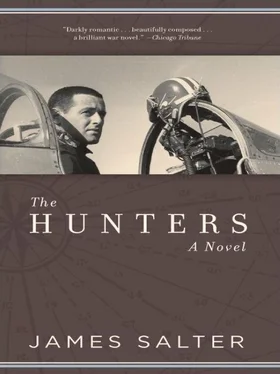Speech seemed completely inadequate to Cleve. It transmitted nothing of time gone and ways dividing. He wanted to put his arm around DeLeo’s shoulder.
“There seems to be a lot I haven’t had a chance to say, Bert.”
“That’s right. All of a sudden.”
“I think you know most of it, though.”
DeLeo did not reply. He brushed a fly from his cheek.
“Remember that day when I first came into the flight? You were all sitting around the table?”
“Sure.”
“You called yourself a wop.”
DeLeo nodded abstractly.
“You’ve made it into one of the finest words I know.”
“I wish you were going with me, Cleve.”
“I wish you weren’t leaving. Somehow I’m still not prepared for that.”
“We’d spend a few days in Tokyo.”
“Like the old times, eh?” He thought of it, everything passing swiftly and inconsecutively through his mind. On a morning long ago they had left to go there. “Well, I’ll get to Tokyo. A little behind you this time.”
“What do you have, twenty-one left?”
“Yes.”
“That’s not many.”
“No. Enough maybe, but not many.”
“It won’t be long,” DeLeo said.
The jeep was coming down the road. They both saw it, far off, and stood watching it approach. After a while they could hear the slamming of its axles on the rough surface and then the ripple of the engine. Cleve helped load the baggage in the rear seat. DeLeo sat down beside the driver. He reached out, and they shook hands with each other. It was the first time, Cleve felt certain, that they had ever done it.
“Take care of yourself, Cleve.”
“You, too.”
Their hands were still clasped, moving reflexively up and down.
“And good luck.” The jeep began to move.
“So long,” Cleve said.
DeLeo gave a little half-salute.
“Sayonara, Cleve.”
He watched the jeep go up the road, make a quick turn, and start back down the hill, round the curve at the bottom, and travel along the road that paralleled the runway, a trail of thin, ascending dust behind it. Then it passed beyond the warehouses and out of sight. All along the road the soft film of dust still hung in the air. He turned and walked toward the barracks.
Being in a squadron was a digest of life. You were a child when you joined. There was endless opportunity, and everything was new. Gradually, almost unknowingly, the days of painful learning and delight were over; you achieved maturity; and then suddenly you were old, with new faces and relationships that were difficult to recognize rising up quickly all around you, until you found yourself existing practically unwelcome in the midst of them, with all the men you had known and lived with gone and the war little more than unsharable memories of things that had taken place long ago. It was like the last year of college, and the final examinations just over. Everybody was rushing to leave, many of them friends. Most of them you would never see again. Desmond was gone, Robey, Daughters, and DeLeo. The rooms were being continually filled with strangers, more of them every week. They knew nothing of the past and its holiness. For them, the war began the day of their arrival, and it would be a long time before they were tired of it and going home themselves, those that finished. Cleve searched, but he could not find himself among them. They were all so inexperienced and confident.
Two of them, replacements just assigned to his flight, came up to him in operations the next day and introduced themselves. They were like grandchildren, generations away from him.
“Kiser, sir,” the first one said.
“Schramm.”
“How much jet time do you have?” Cleve asked.
“Two hundred and twenty hours,” Kiser said.
“I have about the same, two hundred and thirty-eight,” the other added.
“Have you flown this airplane?”
“Yes, sir. In gunnery.”
“That’s good. How much time do you have in it?”
“Let’s see. About forty hours, isn’t that right?”
The second one nodded.
“How long will it be before we go on missions, Captain?” he asked.
“Well, there’s a transition course you have to go through here. Three or four rides, normally.”
“That’s what we heard.”
“Sometimes it takes a while to get the rides in,” Cleve warned.
“Lieutenant Pell said it wouldn’t be more than a couple of days.”
It was that all the time now. Everybody knew him. As they passed him in the evenings or at noon, they would interrupt their conversation. They would turn to see him, to say something. The greetings followed him like wet grass clinging to footfalls in a meadow.
“Hey, Doctor,” they said.
“Hello, Doc, Pell, buddy. Hi there! How’s it going? Hello!”
Hunter and Pettibone were more and more with him. They echoed him when they talked. They appropriated fragments of his speech. It was like some law of the jungle. When he entered, they were behind. When he left, they followed. They gathered to him to protect themselves from oblivion and perhaps discover how to be blessed also. Whether with the innocence of children or in full understanding of what they were accepting, they were his undoubted disciples. With a cigar tucked in the corner of his mouth and looking like a boy imitating his father, Pell would give them advice.
“The most important thing now, Billy Lee, is to build up a lot of flying time—and to get promoted.”
“I don’t see how there’s any chance of promotion,” Hunter argued. They had all become first lieutenants less than a week previously.
“There isn’t. That’s why it’s so important.”
“I don’t see how it’s possible, though.”
“There’s always an angle,” Pell said. “You ought to know that by now.”
“I suppose so.”
Cleve was alone. That was the life he almost seemed to have chosen. The time had gone by when it was easy to make friends. He walked by himself, the web of the past on him like a tangle of invisible rigging.
You lived and died alone, especially in fighters. Fighters. Somehow, despite everything, that word had not become sterile. You slipped into the hollow cockpit and strapped and plugged yourself into the machine. The canopy ground shut and sealed you off. Your oxygen, your very breath, you carried with you into the chilled vacuum, in a steel bottle. If you wanted to speak, you used the radio. You were as isolated as a deep-sea diver, only you went up, into nothing, instead of down. You were accompanied. They flew with you in heraldic patterns and fought alongside you, sometimes skillfully, always at least two ships together, but they were really of no help. You were alone. At the end, there was no one you could touch. You could call out to them, as he had heard someone call out one day going down, a pitiful, pleading “Oh, Jesus!” but they could touch you not.
He wrote to Eiko:
…the days seem really long. It feels like the hours aren’t going anywhere except away, to some gathering place of all lost time, and slowly, very slowly. The air battles are irregular. They come in streaks. Many days with nothing and suddenly MIGs appear and it’s a frenzy. It’s hard to describe. You or them, suddenly, and everything counts.
It was not all he wanted to say but he was anxious to remind her that he was at the front, alone, as it were, defiant.
Heat and endless days. He leaned back in the chair and closed his eyes. He could not decide. Was it courage or enthusiasm, or something even more vital, life itself, that was draining out of him so steadily day after day mission after mission, as if a man were born with, or acquired, only so much of it, never to be replenished?
The days became hot buzzing. Long, dusty walks crossed them. Shoes scuffed at the dry earth, and the sun shone down heavy as mist. Voices at night carried far through the swollen air, and the weak glow of electric lights lasted late in the rooms. It was not easy to sleep—not like the winter with its hushed, blanketed hours and the metal of the stove creaking from the heat. The insects were bad, and there was only Korean ice.
Читать дальше












